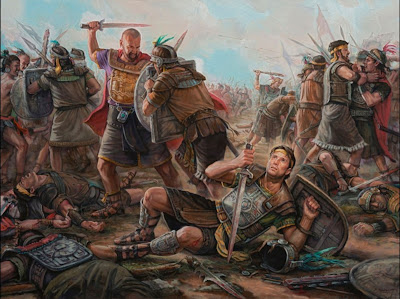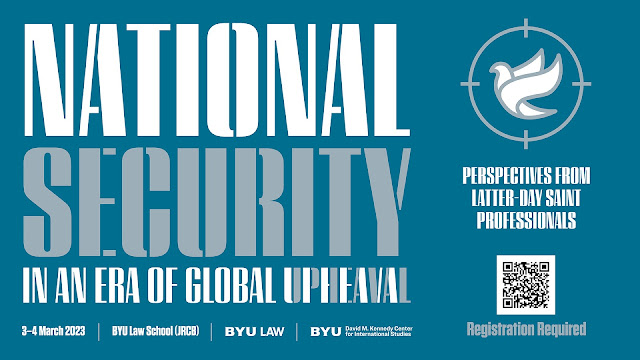 |
| The Stoddards trying to read Rough Stone Rolling |
The last time I discussed Rough
Stone Rolling on social media I received many thoughtless drive by posts. I ignored
them at the time because I don’t want to reward lazy thinking. But I suspected
at the time that their link contained very poor reasoning and after a bit of
examination I was correct. This post show the many flaws in the debunking site
devoted to Rough
Stone Rolling. The Stoddards, writing for the Joseph Smith Foundation misrepresent
Bushman’s work by relying on sloppy and sometimes malicious editing to the
point that we lose a true picture of Joseph Smith as a flawed but still
impressive prophet. (All quotes from the debunking website unless otherwise noted.)
The first two complaints about
RSR had no citations:
They object that Bushman supposedly
said Joseph was involved in ritual magic who used peep stones to find treasure.
If they want to debunk a book
and can’t do better than a social media post I see no need to respond. The next
items had footnotes:
They contend RSR says Joseph Smith suffered from
“treasure-seeking greed,” “anger,” and “easily-bruised pride,”
Greed is simply the implication of Moroni’s warning to
Joseph, which is canonized in church history. Bushman cited Moroni’s words
along with Oliver Cowdery and Lucy Mack Smith saying Joseph immediately thought
of financial concerns when seeing the plates: [Moroni told] me that Satan would
try to tempt me (in consequence of the indigent circumstances of my father’s
family), to get the plates for the purpose of getting rich. This he forbade me,
saying that I must have no other object in view in getting the plates but to
glorify God, and must not be influenced by any other motive than that of
building his kingdom; otherwise I could not get them. Js History 1:40, 53.
Joseph’s anger is seen in his own letters such as the one
Bushman quoted on page 187 of RSR and cited in fn 44. The Stoddards seem to be
under the impression that Joseph never had any emotion. But we don’t feel
Moroni is any less of a man that could shake the foundations of hell because he
showed anger, and we shouldn’t be offended over Joseph’s.
Bushman isn’t insulting Joseph by describing his
personality. This is a common complaint in just about every criticism of
Bushman, and I will give same answer. Studying everything about Joseph, and not
the whitewashed sanitized version of him will lead to stronger testimonies that
can withstand new and unexpected information, because it already fits in the
paradigm of the awesome and imperfect prophet.
Getting back to Smith’s anger, we have many accounts of Joseph’s
anger because his admirers shared these stories to show how great he was despite
his flaws. In the example the Stoddards cite on page 249 and 250 of RSR they
make it seem like Bushman simply denigrates the prophet. But when you put the
statement in context, Bushman discusses Josephs anger, but also his leadership
skills, and how the high council sided with Joseph because “they sensed that
their prophet had a right to rebuke his followers, fiercely if necessary. Their
dismay at his anger was balanced by their love of his good nature.”
There is an irony here, as quoting outrageous information
out of context is an anti-Mormon method. I find it very sad and saying that the
Stoddards have to do the same shady tactic to try and slam Bushman. That should
tell you how much to trust their quotes and videos, and why you should read
Bushman, and pour through his citations for yourself.
“Easily bruised pride” is also taken out of context. It is
even worse this time because they ignore, literally, half the sentence that
describes Joseph’s desire for peace. To start with, it isn’t insulting Joseph
to admit he struggled with the man he is, with the man he wants to be. Elder
Uctdorf said that a hypocrite is someone who falls short of the person they
want to be, and we are all hypocrites. As a former marine that came from a home
with an angry and abusive father, I know how hard it is to break out of
patterns and respond in a more Christlike fashion. The supposed insult from
Bushman, when put back into context on page 295, actually endears us to Joseph:
Unfortunately for his peace of mind, Joseph’s angry responses conflicted with the harmony and brotherhood he prized…The culture of honor moved him to contend with the offending parties to protect his easily bruised pride, even though all the while he wanted peace. He hated contention and tried to make peace by mutual confessions and brotherly arbitration….By 1836, when he made peace with his antagonists, the meaning of Zion to a man of his temperament was clear. To live in harmony with his brothers and sisters, as the revelations required, was reason to rejoice.
Harmony was valued in all the church’s councils. The Kirtland High Council’s hearings examined the attitudes of offending parties as well as their actions. The minutes refer to “the spirit of meekness,” or “feelings of the heart,” or the “spirit of justification and pride.”
Not only is the above based in primary sources, so Bushman is not simply making up insults to Joseph’s character, but in context, Joseph appears much like the rest of us. He is trying to rise above his nature to live in harmony. I find my testimony and even love for Joseph strengthened after reading this.
Joseph possessed “outrageous confidence.”
I take that as a compliment to Joseph. The world and the
restored church needed a prophet with unbounded confidence in his mission to
restore the gospel, bring forth new scripture, and translate previously
untouchable ones like the Bible all while gathering his people, building zion
and temples and withstanding endless defections, legal attacks, persecution and
dislocation. I argue that anyone without “outrageous confidence” wouldn’t have
been as successful as Joseph.
Joseph “[f]rom time to time drank too much,”
The footnotes for this source show a variety of conflicting
sources. It’s about a paragraph long and I highly recommend you read it on page
43. But without getting off into the weeds, it can easily be among the sins
Joseph himself alluded to in his history when he said: I was left to all kinds
of temptations; and, mingling with all kinds of society, I frequently fell into
many foolish errors, and displayed the weakness of youth, and the foibles of
human nature; which, I am sorry to say, led me into divers temptations,
offensive in the sight of God. In making this confession, no one need suppose
me guilty of any great or malignant sins. A disposition to commit such was
never in my nature. JS History 1:28.
Of course, even if he did drink, so what? The prophet Noah
in the Bible was found drunk and naked! The Word of Wisdom wasn’t given until a
decade later and wasn’t enforced strictly until about a century after that. Prophets
aren’t perfect, especially when Joseph himself says, canonized in scripture,
that he fell into various misdemeanor sins in his youth.
Joseph grew up with an “oft-defeated, unmoored father”—a
father who “partially abdicated family leadership.”
It is pretty common knowledge that Joseph Sr. had a great
deal of hardships during his life. Joseph. Sr. wasn’t the prophet and he
admitted he made many mistakes in life. The second statement misquotes Bushman
who says Joseph Sr. may have abdicated leadership. And Bushman says that
after quoting Joseph Sr. himself: I have not always set the example before my
family that I ought (pg. 42).
As a parent I can appreciate the humble admission. Joseph Sr. did what most
parents do, and he wondered if he was doing a good job and felt badly that he
couldn’t be more for his children.
This is another out of context misquote from the Joseph
Smith Foundation and this one might be the worst. They took something that was equivocal,
(“may have”) made it a definitive statement, and then failed to quote the
primary source, straight from Joseph Sr’s mouth where he admitted his failings
when it was literally quoted right next to the supposedly insulting sentence.
That is so deliberately edited to give an impression the author didn’t intend
it seems deceptive to me. They deliberately want you to hate RSR (so they can
hawk their books a second later) and have to mangle their quotes of Bushman to
do it.
There are more quotes from various discussions of RSR from
Bushman and anti-Mormons but I don’t feel the need to make this post any longer
by quoting them. Probably because those quotes are selectively edited like
their other quotes. But more importantly, they don’t change any of the points I
made above. The common complaint from the Stoddards and the JSF is that a
Joseph with flaws is damaging to testimonies and insulting to Joseph. As I
demonstrated above, studying Joseph carefully, including his flaws, makes him
more relatable and appealing. I felt this as I read RSR and compiled this post.
More importantly, I’ve said many times the only testimonies damaged by a more
realistic picture of Joseph are those who believe in a perfect Joseph Smith of
their imagination. Some are so ensconced in their imaginations about Joseph
Smith they can’t even read books like RSR. That is so astoundingly small
minded, and refusing to learn is far more damaging attitude than anything
Bushman can say or write. If your brittle testimony can’t handle new
information, you’ll still get the new information eventually, but you’ll have
no mechanisms for how to faithfully incorporate that new knowledge into a
faithful view of the prophet. That’s why so many people are overthrown by a
reddit complied, dumb big list of stale criticisms. (The CES letter.) If you’ve
always studied the real (and still awesome) Joseph, you’ll have a much greater
ability to accept new information. The mention of a peep stone or treasure
digging won’t send you into a faithless spiral, or hyper aggressive defensive
response that is built upon sand.
Rough Stone Rolling is far superior to the “debunking RSR” website. The answer
is obviously provided by Bushman’s superior primary source analysis, as the
Joseph Smith Foundation has to do the opposite, rip quotes out of context with
highly suspicious editing to strengthen the animosity against Bushman and
support an inferior fantasy about Joseph.
I work as a freelance author. Providing ad free, quality research takes time. If found value in this work please consider donating using the paypal button below or buy one of my books linked in the top left.









